Jacob
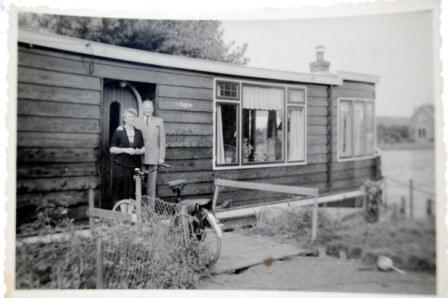 This
is Jacob on a houseboat with his wife. That's where they lived in after
WW II.
This
is Jacob on a houseboat with his wife. That's where they lived in after
WW II.
In fact, Jacob passed a lot of his life on ships. As a young man he
worked in catering on a shipping line to the Dutch Indies.
The situation they lived in on this picture had all to do with the
circumstances and personal choices made before.
They did not have much that time, but at least had eachother and the
children again, after having been imprisoned.
Jacob was the oldest. Named after the father of his father, who was
named after his father etc etc. In these generations they were not very
original in giving names,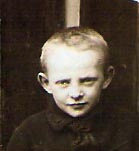 men just gave
the sons the same names as
themselves. Still, it's a nice, old, Jewish name, a name of one of the
Arch fathers.
men just gave
the sons the same names as
themselves. Still, it's a nice, old, Jewish name, a name of one of the
Arch fathers.
His own father Sjouke had his name
from the father of his mother,
Sjouke Beers Polstra.
It is said, firstborn have, according to statistics, more leadership
qualities than later born. This certainly goes for Jacob. He was a
manager in hotelbusiness most of his working life and did so rather
well. What jeopardized his career was the choice for the Dutch National
Socialist movement.
He was born on may the 6th 1901, in the town of Meppel. But grew up,
like all his brothers and his sister in Emmen. He had enough
restlessness to wander off on a very young age. First he went to the
Hotelschool in The Hague. After that he went sailing, which he
did for several years, working in the restaurant on board ship.He
developed a good career, starting as as waiter, doing management later
on.
On one of his trips he met his future wife Frieda, in Amsterdam in the
harbour. They later met again in the Dutch Indies, and decided to get
engaged and later married.
Jacob had it all planned out: first engage, then sail a few journeys
more, then take over the hotel business in Emmen from his eldering
parents. This was 1932/33. A new house for the parents designed by
brother Klaas and built next to the
hotel. See: the Kolhoop. The hotel
itself was modernized.
It was in these days, that Jacob got sympathy for the ideas of a
certain mr. Mussert, leader of the Dutch national socialist movement
NSB. There had been a worldwide economic crisis and great poverty
in the East , Germany. Democracy had no answer to that, could not solve
poverty.
Instead, in Germany, a man was elected, who solved a lot of problems
like unemployment overthere. Well yes, he was kind of an antisemite,
and killed and terrorised al that opposed him. Hitler was his name.
The NSB not so much wanted to get the Germans into the Netherlands, as
well as develop a 'Dutch version' of this succes. After the nazis had
bombarded Rotterdam, killing many people, imposed their power and later
on deported all the jews, this same NSB of course was used as an
instrument by the occupators.
But, as our queen Beatrix stated in public while in Israel, the
sad conclusion must be drawn that an awful lot of Dutch people
collaborated with the nazis during this time.
Real heroes, like my uncle Klaas, in
fact were scarce.
So, Jacob became an important member of this movement. A man of
principals he was too. When food was rationed, he did not want to use
his position to obtain more rations than he was formally entitled to.
He simple believed in the ideas of the movement he commited himself to.
And never turned.
How he reacted when his own brother was arrested and shot, we will
never no. My guess is, he found it sad, but was also convinced his
brother had done daft things.
I thought about it, whether Jacob could have saved his brother. I came
to the conclusion: in the dictatorship of these days: no.
War ended on may 5th 1945, a day before Jacob had his 44th birhtday. It
will not have been a nice birthday.
Quickly after that he and his wife were arrested and detained. Nobody
bothered about their children. The shame of these days. Kids of
arrested collaborators were simply left alone.
They found a place to live at first at their grandmother Janna and aunt
Frouwkje. Till these were
arrested too. Then the little girl Coby sat on
the doormat of her grandmothers house with her little babybrother of
1,5 years old with no place to go. She did not know where her parents
were, did not know where to go, did not understand the situation, only
understood she was punished for something she had no part in.
Heartbraking, to me it is. "That's war", others might say, or "shit
happens". Well, I think it sucks, bigtime.
Jacob and his wife were kept imprisoned for quite a while. The
treatment was harsh, and not always what might be expected in a
constitutional state, to say the least. Later on, the situation
stabilized and it came more in line.
There is a book by A.D.Belinfante, "In plaats van bijltjesdag"(freely
translated: "instead of payback time"), in which the process is
well described.
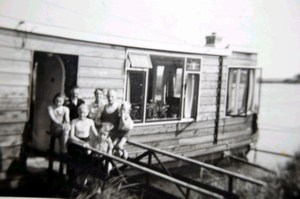 Jacob
however, felt unjustly treated all his life. The few times I met him,
he always began complaints about "see things from an other point of
view" and unjust things done. Well, to me it felt bad then as he said
it, and it still does.
Jacob
however, felt unjustly treated all his life. The few times I met him,
he always began complaints about "see things from an other point of
view" and unjust things done. Well, to me it felt bad then as he said
it, and it still does.
He and his family picked up the pieces later. They reunited and lived
on a houseboat for quite a long time. Jacob worked in the restaurant
business mainly, sometimes haunted by his past in his career. He worked
in "Avifauna", quite a unique
birdpark, combined with a restaurant. In later days he owned a hotel in
the Hague, hotel Hage.
Jacob and Frieda had one handicapped daughter, born with a braindefect, which affected
her physical as well as her mental abilities.
He was a very dedicated loving father for her, and took care for her as
long as he was able to. She was a very enthousiastic knitter. She
knitted me a scarf
once, which I wore for a long time. It was a sweet girl, called
Hanneke.
The family on the houseboat.
When retirement came, Jacob wanted to settle down with his wife in
Friesland, in Warns. His brother Joop had helped created a home for
elderly people there and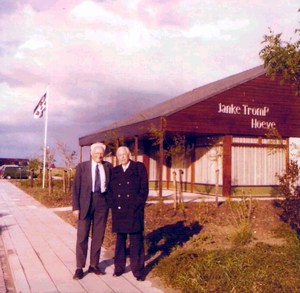 they went to live
there. It's called the Janke Tromp hoeve. Alas, Frieda died
before the house was ready.
they went to live
there. It's called the Janke Tromp hoeve. Alas, Frieda died
before the house was ready.
He lived there alone. As he resembled his younger brother, people often
mistook him for Joop, who had been a public figure for over 15 years in
Warns.
He even married again with a women and lived happy with her for several
years.
Jacob(left) with his brother Joop in front of the
newly built home for elderly in
Warns.
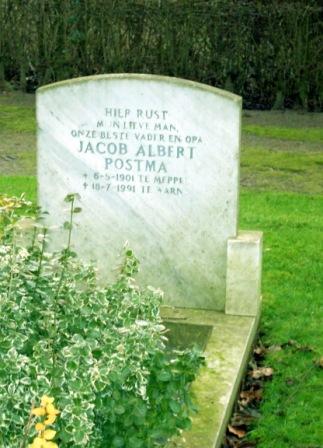 Jacob died in 1991, in Warns, a
few hundred meters from the place I was born in 1959.
Jacob died in 1991, in Warns, a
few hundred meters from the place I was born in 1959.
He is buried on the cemetary of Mirns, a tiny hamlet at the border of
the IJsselmeer,
next to his first wife. Their handicapped daughter, who died in 1995 is
buried there too,as is his second wife.
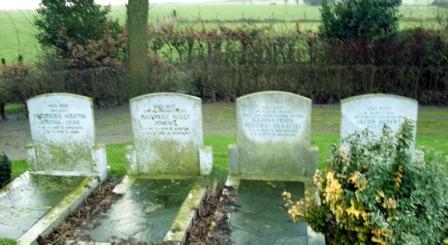
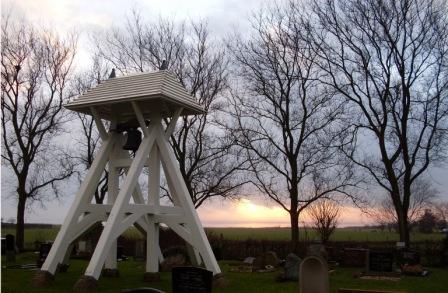
Back to the hotel
To the Familyportrait
 This
is Jacob on a houseboat with his wife. That's where they lived in after
WW II.
This
is Jacob on a houseboat with his wife. That's where they lived in after
WW II. men just gave
the sons the same names as
themselves. Still, it's a nice, old, Jewish name, a name of one of the
Arch fathers.
men just gave
the sons the same names as
themselves. Still, it's a nice, old, Jewish name, a name of one of the
Arch fathers. Jacob
however, felt unjustly treated all his life. The few times I met him,
he always began complaints about "see things from an other point of
view" and unjust things done. Well, to me it felt bad then as he said
it, and it still does.
Jacob
however, felt unjustly treated all his life. The few times I met him,
he always began complaints about "see things from an other point of
view" and unjust things done. Well, to me it felt bad then as he said
it, and it still does. they went to live
there. It's called the Janke Tromp hoeve. Alas, Frieda died
before the house was ready.
they went to live
there. It's called the Janke Tromp hoeve. Alas, Frieda died
before the house was ready. Jacob died in 1991, in Warns, a
few hundred meters from the place I was born in 1959.
Jacob died in 1991, in Warns, a
few hundred meters from the place I was born in 1959. 
